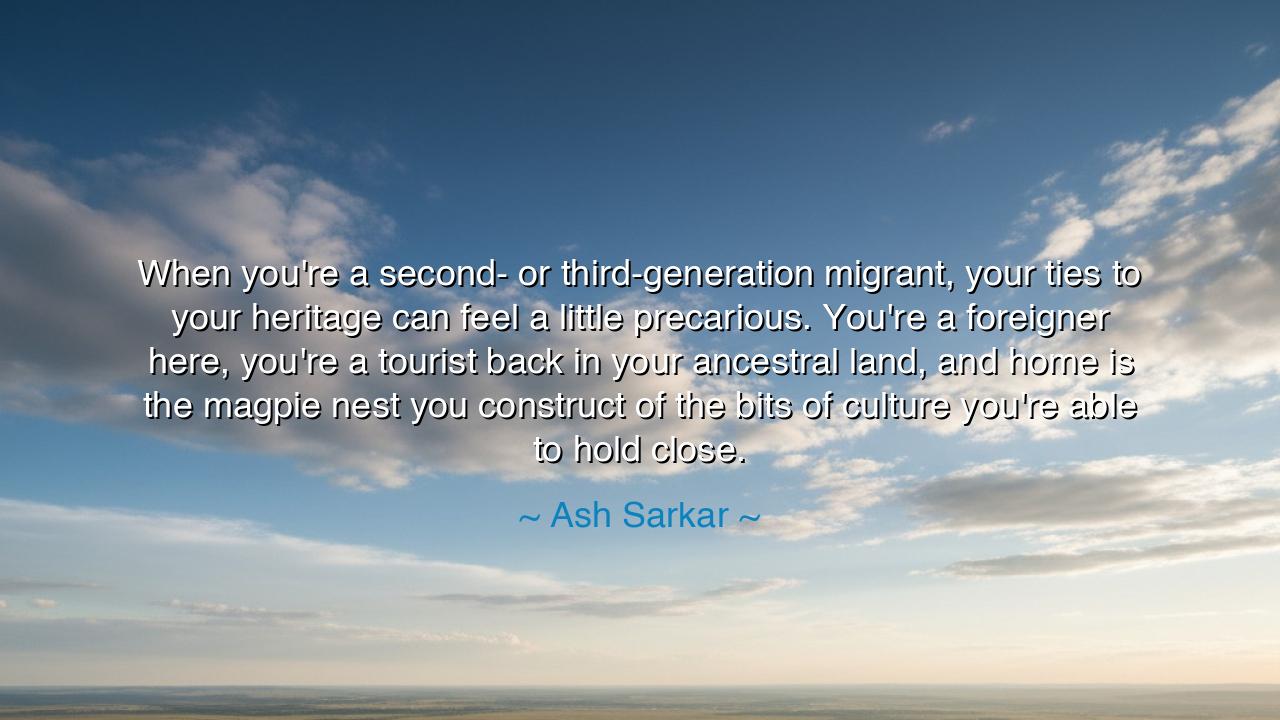
When you're a second- or third-generation migrant, your ties to
When you're a second- or third-generation migrant, your ties to your heritage can feel a little precarious. You're a foreigner here, you're a tourist back in your ancestral land, and home is the magpie nest you construct of the bits of culture you're able to hold close.






In the ancient quiet of the soul, the words of Ash Sarkar rise like incense through the halls of memory: “When you're a second- or third-generation migrant, your ties to your heritage can feel a little precarious. You're a foreigner here, you're a tourist back in your ancestral land, and home is the magpie nest you construct of the bits of culture you're able to hold close.” This saying is both a lament and a hymn—a cry from those who dwell between worlds, whose hearts are stitched together from fragments of heritage, identity, and belonging. It speaks of the timeless human struggle to find home, not merely in geography, but in spirit.
Long ago, the ancestors of many peoples crossed oceans and deserts, fleeing famine, war, or seeking a brighter dawn. Yet the children of those journeys—the second and third generations—awoke in strange lands where the soil was foreign, the language new, and the customs unfamiliar. Their roots stretch deep into histories they never lived, and their leaves unfold beneath suns their forebears never saw. Thus, their ties to heritage become delicate threads—beautiful, but strained between remembrance and reinvention. They are the keepers of stories told in accents not their own.
Consider the tale of Odysseus, who, after years of wandering, found that his home was not as he remembered. Though the Ithaca of his dreams still stood, time had altered its face. In his journey, we find the eternal echo of the migrant’s heart: to seek the shore of one’s ancestors and yet find oneself a tourist in one’s own land. Such is the fate of those whose lineage is dispersed like seeds upon the wind—forever searching for soil that remembers their name.
Yet, there is beauty in this dissonance. For those who live between worlds become magpies of culture, gathering precious fragments—language, song, ritual, scent—and weaving from them a new nest of identity. This nest is not lesser than the ancestral home; it is a creation of resilience and love, built from what could be salvaged across distance and time. It is both fragile and unbreakable, for it exists in the heart’s refusal to forget.
In the fires of the twentieth century, countless such nests were forged. When Indian and Caribbean migrants came to Britain after the war, they brought with them spices, faiths, rhythms, and tongues that colored the gray of the empire. Their children were born to streets that sometimes spat at them, yet from those same stones rose new forms of art, poetry, and protest. These were the hybrid souls—neither fully here nor there, yet somehow more than both. In them, we see that identity is not purity, but harmony composed of contradictions.
The wise among us learn to make peace with the in-between. To be a foreigner here and a tourist there is not a curse but a sign that one belongs to the larger earth, whose dust remembers every footstep. The child of two or more worlds must not mourn what is lost, but celebrate what is created anew. The magpie nest may be patchwork, but it glitters with treasures unseen by those whose lineage lies unbroken in one place.
The lesson, dear reader, is this: do not seek to return to a past that no longer exists, nor to fit perfectly into a land that does not yet know your song. Instead, gather what is true, what is sacred, what resonates in your blood and spirit. Learn your ancestors’ names, their prayers, their recipes, their dreams—but also write your own verse in the story of your people. Build your home of belonging from courage, memory, and love.
Let your identity be both an inheritance and a creation. When you feel the ache of not belonging, remember: you are the bridge your ancestors built to reach the future. You are the living testament that cultures can blend and survive. So build your magpie nest proudly—bright with fragments of all that you are—and know that within its woven strands lies a truth as old as time: home is not where you come from, nor where you are, but what you carry faithfully within your soul.






AAdministratorAdministrator
Welcome, honored guests. Please leave a comment, we will respond soon